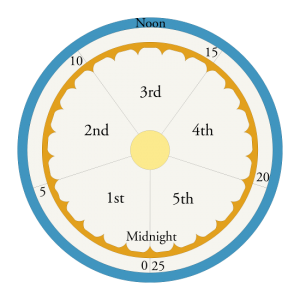Difference between revisions of "Quintary"
Jump to navigation
Jump to search
Trismegistus (talk | contribs) (created) |
Trismegistus (talk | contribs) m |
||
| Line 1: | Line 1: | ||
[[File:Quintary.png|thumb|300px|Example showing the face of the 25-hour clock common on Asdar]] | [[File:Quintary.png|thumb|300px|Example showing the face of the 25-hour clock common on Asdar]] | ||
| − | An international term for the commonly used twenty-five hour clock, divided into five 'quintaries' of five hours each. A twenty-five hour period according to modern-day Pallathantic reckoning begins at midnight. Anciently, the Yophentheans reckoned the new day from noon, in honor of the greatest power of the sun, not at midnight. | + | An international term for the commonly used twenty-five hour clock, divided into five 'quintaries' of five hours each. A twenty-five hour period according to modern-day Pallathantic reckoning begins at midnight. Anciently, the Yophentheans reckoned the new day from noon, in honor of the greatest power of the sun, not at midnight. |
The value of five and five squared is also associated with month which typically have twenty five days. It is also associated with the power of Chaos in some contexts. | The value of five and five squared is also associated with month which typically have twenty five days. It is also associated with the power of Chaos in some contexts. | ||
Revision as of 02:16, 19 April 2014
An international term for the commonly used twenty-five hour clock, divided into five 'quintaries' of five hours each. A twenty-five hour period according to modern-day Pallathantic reckoning begins at midnight. Anciently, the Yophentheans reckoned the new day from noon, in honor of the greatest power of the sun, not at midnight.
The value of five and five squared is also associated with month which typically have twenty five days. It is also associated with the power of Chaos in some contexts.
See Also
| This article is a stub. It requires further development by the creator. |
